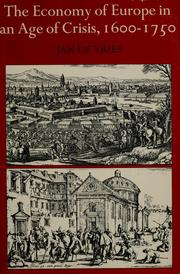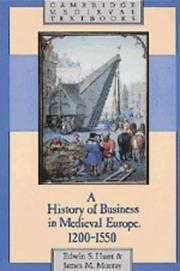| Listing 1 - 2 of 2 |
Sort by
|

ISBN: 0521290503 0521211239 1316152901 1107049776 9780521211239 9780521290500 9781107049772 Year: 1976 Publisher: Cambridge: Cambridge university press,
Abstract | Keywords | Export | Availability | Bookmark
 Loading...
Loading...Choose an application
- Reference Manager
- EndNote
- RefWorks (Direct export to RefWorks)
By relating economic changes to the political backdrop, "The economy of Europe in an age of crisis, 1600-1750" describes and analyzes the economic civilization of Europe in the last epoch before the Industrial Revolution. The author makes a special effort to apply economic reasoning to the economic forces of the period and challenges some longstanding opinions about what was and was not important in explaining economic performance. The significance of this study rests in its identification of the ways a "traditional" society developed its economy despite the absence of the obvious growth factors of the nineteenth century. The approach is consciously comparative : problems of interpretation are identified ; research not yet available elsewhere is incorporated into the text ; and examples are drawn from minor as well as major countries in western and central Europe. Topics dealt with include the development of agriculture and industry, foreign and regional trade, urbanization, a study of demand (as opposed to supply) in explaining economic growth, the bourgeoisie, and the state ; footnotes refer readers to recent literature in the various topics covered.
Europe --- History --- Economic conditions --- -Economic conditions --- -History of Europe --- anno 1600-1699 --- EUR / Europe - Europa --- 331.100 --- Economische geschiedenis: algemeenheden. --- Council of Europe countries --- Eastern Hemisphere --- Eurasia --- -History --- -Europe --- History of Europe --- -Geschiedenis van Europa --- Geschiedenis van Europa --- Economische geschiedenis: algemeenheden --- -EUR / Europe - Europa --- anno 1700-1799 --- Europe - History - 17th century --- Europe - History - 18th century --- Europe - Economic conditions - 17th century --- economische geschiedenis --- Conditions économiques

ISBN: 0521499232 0521495814 1139159755 9786613340887 1139155199 0511626002 1283340887 113916077X 1139158724 1139156969 9781139160773 1107189462 9780511626005 9780521495813 9780521499231 Year: 1999 Volume: *15 Publisher: Cambridge: Cambridge university press,
Abstract | Keywords | Export | Availability | Bookmark
 Loading...
Loading...Choose an application
- Reference Manager
- EndNote
- RefWorks (Direct export to RefWorks)
This book demolishes the widely held view that the phrase 'medieval business' is an oxymoron. The authors review the entire range of business in medieval western Europe, probing its Roman and Christian heritage to discover the economic and political forces that shaped the organization of agriculture, manufacturing, construction, mining, transportation and marketing. Businessmen's responses to the devastating plagues, famines, and warfare that beset Europe in the late Middle Ages are equally well covered. Medieval businessmen's remarkable success in coping with this hostile new environment was 'a harvest of adversity' that prepared the way for the economic expansion of the sixteenth century. Two main themes run through this book. First, the force and direction of business development in this period stemmed primarily from the demands of the elite. Second, the lasting legacy of medieval businessmen was less their skillful adaptations of imported inventions than their brilliant innovations in business organization.
History of Europe --- Economic relations. Trade --- anno 1200-1499 --- anno 1500-1599 --- 338 <09> "04/14" --- Economische geschiedenis--Middeleeuwen --- Banks and banking -- Europe -- History. --- Economic history -- Medieval, 500-1500. --- Europe -- Commerce -- History. --- Europe -- Economic conditions. --- Banks and banking --- Economic history --- Commerce --- Business & Economics --- Local Commerce --- History --- Europe --- History. --- Economic conditions. --- Arts and Humanities --- 338 <09> "04/14" Economische geschiedenis--Middeleeuwen --- Banques --- Histoire économique --- Histoire --- Conditions économiques --- Agricultural banks --- Banking --- Banking industry --- Commercial banks --- Depository institutions --- Finance --- Financial institutions --- Money --- E-books --- Economic conditions --- Medieval, 500-1500 --- Middle Ages, 500-1500 --- Banks and banking - Europe - History. --- Economic history - Medieval, 500-1500. --- Banks and banking - Europe - History --- Economic history - Medieval, 500-1500
| Listing 1 - 2 of 2 |
Sort by
|

 Search
Search Feedback
Feedback About UniCat
About UniCat  Help
Help News
News